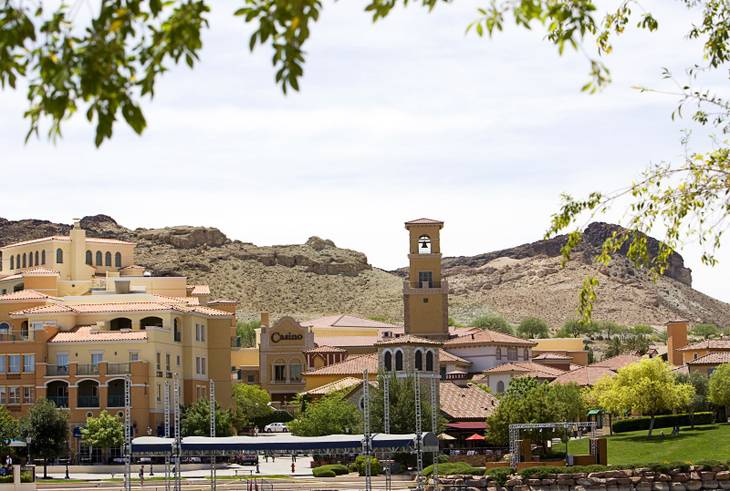Map of Lake Las Vegas Resort
Credit Suisse AG sued two of the billionaire Bass brothers of Texas and other investors Friday in the bank’s latest effort to recover hundreds of millions of dollars in losses from loans to the Lake Las Vegas development.
Lake Las Vegas is a 3,600-acre, 1,600-home resort development in Henderson. Like other developments in the Las Vegas area, it was hit hard during the recession by foreclosures, plummeting property values and canceled construction and development plans.
In the complaint filed in U.S. Bankruptcy Court in Las Vegas, Credit Suisse is seeking an injunction against Lee Bass, Sid Bass, Transcontinental Corp. of Santa Barbara, Calif., and other Lake Las Vegas investors.
The injunction would block the investors from attempting to revoke confirmation of, or to otherwise attack, the court’s 2010 order confirming the Lake Las Vegas Chapter 11 bankruptcy reorganization plan.
Under the reorganization plan, the Lake Las Vegas bankruptcy creditor trust sued the Bass brothers, Transcontinental and other investors last year in hopes of recovering $470 million in profits or capital they had taken out of Lake Las Vegas before it collapsed into bankruptcy. The creditor trust claims the investors drained Lake Las Vegas of equity, dooming it to financial collapse. Most of the litigation proceeds, if any, would go to Credit Suisse.
The investors later filed a cross-complaint suggesting Credit Suisse, as the main Lake Las Vegas lender, had double crossed them.
The investors said Credit Suisse, with a unique and controversial loan product it sold in the mid 2000s to resort developments, including Montana’s Yellowstone Mountain Club, had encouraged the investors to make the capital distributions to themselves. These loans are now the subject of litigation around the country, including claims they were based on inflated appraisals and were predatory in that they saddled the developments with excessive debt — charges denied by Credit Suisse.
The Lake Las Vegas investors said the $670 million in loans to Lake Las Vegas were non-recourse against the investors — that is, Credit Suisse’s only recourse in a default was to foreclose on the Lake Las Vegas company and its undeveloped land holdings.
The investors complained Credit Suisse would be unjustly enriched if the creditor trust recovered the $470 million, as Credit Suisse had already effectively foreclosed on and taken over Lake Las Vegas.
On June 17, U.S. Bankruptcy Judge Linda Riegle dismissed the investors’ cross-complaint. She ruled the creditor trust’s complaint alleging fraudulent transfers had nothing to do with the original loan agreements — the agreements the investors were relying on in their complaint.
The investors last month appealed her ruling to U.S. District Court.
In Friday’s complaint, Credit Suisse complained the investors had also filed a lawsuit in Los Angeles County Superior Court on Aug. 12 asserting the same claims that Riegle had rejected.
Attorneys for the bank said that under bankruptcy law, the California lawsuit was an impermissible attack on the Lake Las Vegas confirmation plan order.
They said if the state court lawsuit is successful, it would effectively revoke the Lake Las Vegas confirmation order by interfering with the distribution of estate assets to holders of claims — i.e., it would prevent Credit Suisse from receiving litigation proceeds won from the investors.
“Credit Suisse is entitled to the entry of a preliminary and permanent injunction to prevent defendants from continuing to prosecute the state court action,” said the complaint, filed by attorneys with the law firms Sidley Austin LLP in Los Angeles and Gordon Silver in Las Vegas.
In their Los Angeles lawsuit against Credit Suisse and other lenders, attorneys for the Bass brothers and the other investors wrote that should the Nevada bankruptcy creditor trust recover any funds, “defendants are precluded from retaining any of the funds and ...that any retention of such funds would constitute a breach of contract, a breach of the covenant of good faith and fair dealing and unjust enrichment.”
The investors said the California state court has jurisdiction in the matter because, among other things, the loans at issue were negotiated by a Credit Suisse office in Century City in Los Angeles County.
The California suit seeks a declaration that loans issued in 2004 and 2007 are valid and enforceable contracts and that they’re non-recourse with respect to the investors.
“The defendants are using their control of Lake Las Vegas and the (bankruptcy) plan to circumvent their (pre-bankruptcy loan) agreement not to seek recovery from any distributee of loans made pursuant to the 2004 agreement or any equity holder of the corporate borrowers in the 2007 agreement,” the Los Angeles lawsuit charges.
The investors are represented in that suit by attorneys with the law firms Irell & Manella LLP in Los Angeles, RoganLehrman LLP in Santa Monica and Beck, Redden & Secrest LLP in Houston.
A Nov. 8 hearing was set in bankruptcy court in Las Vegas on Credit Suisse’s motion for an injunction blocking the investors from prosecuting the California lawsuit.
